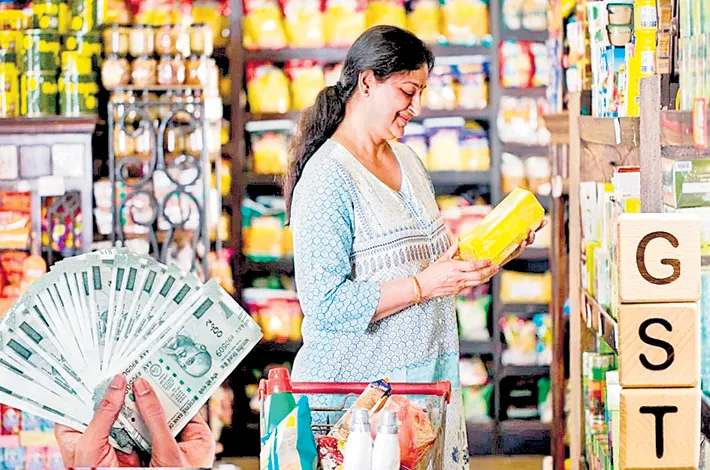GST shake up, what Hyderabadis think
24-09-2025 12:00:00 AM

The Union Government’s new GST regime and its reclassified structure has brought smiles to some and discontent to many. Hema Singuluri finds out…
With the Union Government’s major Goods and Service Tax (GST) overhaul happening this week, the change is already weighing its impact in Hyderabad. The new GST regime and its reclassified slab structure is bringing out varied responses from business owners to public about tax revenue and fairness in GST implementation. Electronics, automobiles and essentials are now cheaper and see a tax relief while the other premium categories and tobacco, alcohol attract high prices.
John, a young IT professional in Hyderabad shared his experience emphasizing on the daily life effects of the new GST structure. His frustration deepened when he visited the movies where the salted popcorn cost Rs 300, but the caramel popcorn was Rs 500 with 18% GST indicated as “Luxury Refreshments” also highlighting the hike on cigarettes and alcohol. John also spent Rs.11,000 last month for groceries at Metro Cash and Carry, only to see GST adding another 18% pushing the bill to Rs.13,500. “Though the difference is Rs 2000, for a person with average monthly income it is a huge effect,” he groaned John.
However, current reforms have sharply reduced the GST as from September 22, 2025, India moved the GST slabs again. Where there were mainly four GST rates (5%, 12%, 18% and 28%), many goods have been reclassified now into two main slabs 5% (for many daily essential goods) and 18%. Especially the essentials are becoming GST reduced or having GST removed entirely.
Retailers across Hyderabad are witnessing gradual changes. Vijay, supervisor of Annapurna Mart at HMT Road, Kukatpally, noted “Customers are happy, and the sales are up as the general grocery and food items just had rapid GST reduction”. Local stores are also showing growth as the owner at Bhagya Laxmi Store in Kukatpally said, “The Common items such as ghee, bread, milk are getting cheaper, specifically the rice bags and snack items, which are reducing the overall billing of regular customers attracting several more.”
While some are affected, many argue that GST regime is bringing benefits especially in the automobiles and electronics sector. Venu, a Chartered Accountant and an Accounts Manager at Hyderabad Overseas Consultants, strongly believe that the new cuts are productive. He said that the cuts in general essentials are helpful but the youngsters and middle-aged consuming tobacco and alcohol are affected. Notably, the GST on small cars and electronics that rationalized from 28% to 18% sparking the purchase increase in electronic items and benefiting the customers. With GST reductions, many sellers are offering attractive discounts drawing numerous customers, improving sales strategy.
Mixed impact on construction and vehicles has been experienced. Saiteja Yalakanti, a manager at a private interior and construction company said that construction and interior materials now with 5% GST haven’t made a difference as most of the clients expect few individuals pay direct bills to skip GST. However, he purchased a new Royal Enfield bike with 35 CC Engine capacity which cost him much less GST. “I saved more than 25 thousand rupees as regular bikes with below 350 cc engine capacity now have lesser GST helping common men like me a lot,” he noted.
Apart from this, the real affected ones are the consumers of cigarettes, alcohol and other “sin goods” which have been hit with increased GST. Retailers say that consumers, especially the youngsters are affected by the hike but in a way, it is good for public health which is a positive outcome. For now, the revenue shortfall of Telangana is a pending concern, but the change has bought a relief going a little easier on essentials.








